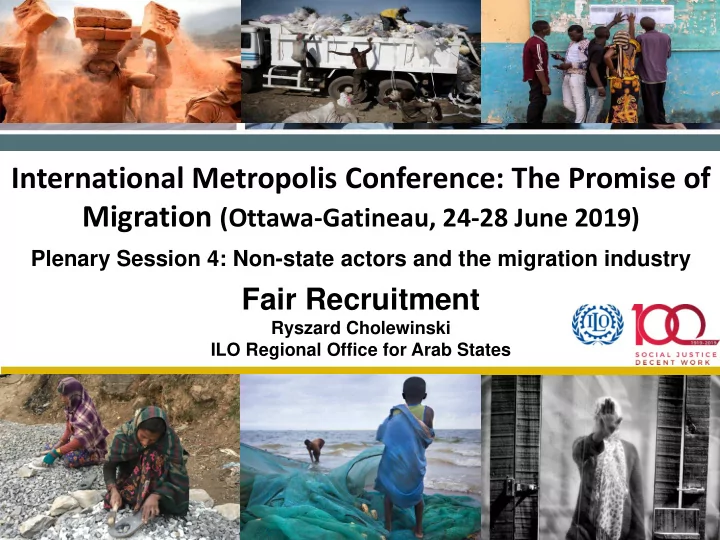

International Metropolis Conference: The Promise of Migration (Ottawa-Gatineau, 24-28 June 2019) Plenary Session 4: Non-state actors and the migration industry Fair Recruitment Ryszard Cholewinski ILO Regional Office for Arab States
Fair recruitment in context 258 million 48 per cent international women migrants migrants in 2017 164 million 260,000 migrant workers Private Employment - 58% men and Agencies worldwide 42% women Up to 10 billion USD Low-skilled workers, in illegal recruitment both migrants and fees are collected nationals, are particularly annually from migrant at risk of recruitment workers abuses and forced labour
Why fair recruitment matters? Factors limiting positive effects of migration High cost of labour migration, including recruitment fees and related costs, for low-skilled migrant workers Risk of trafficking and forced labour Limited labour market integration – discrimination and/or exploitation, low wages, poor working conditions Underutilization of skills - skills recognition and skills matching
Why fair recruitment matters? Key challenges for workers Charging of recruitment fees and related costs Threats and intimidation, abuse and violence Deception with regard to contracts, working and living conditions Restriction of freedom of movement and retention of passports Recruitment below working age or into hazardous work Key challenges for governments/ policymakers Ensuring effective regulatory frameworks are in place and enforced Ensuring bilateral or regional agreements are in place, effectively monitored and protect workers Addressing rapidly changing migration landscape and labour market characteristics
Why fair recruitment matters? Key challenges for employers • Employers can also face high costs • Information asymmetry • Need to match workers’ skills to those needed by the employer Key challenges for recruitment agencies • Lack of appropriate government regulation and oversight can create commercial uncertainties • Increasing cost to business especially when corruption and bribery occur in the recruitment process • Overly complex regulation can impede fair labour recruiters from entering the market
Growing consensus on reducing migration and recruitment costs Relevant international initiatives UN Secretary-General’s Report to UN High-level Dialogue on International Migration and Development 2013 UN 2030 Agenda: SDG 10.7.1 Recruitment cost borne by employee as a proportion of yearly income earned in country of destination ILO General Principles and Operational Guidelines for Fair Recruitment and Definition of recruitment fees and related costs The UN Global Compact for Safe, Orderly and Regular Migration, Objective 6 Abu Dhabi Dialogue: Colombo Ministerial Declaration, 24 Jan 2017 / ADD SOM Communiqué (May 2018) Several multi-stakeholders initiatives (WEC, IHRB, RBA, ITUC-MRA, IOM-IRIS) Relevant national / bilateral initiatives More than 90 countries regulate recruitment fees Bilateral agreements with specific provisions on recruitment
Fair Recruitment Initiative 1. Enhance global knowledge of national and international recruitment practices SDG Indicator 10.7.1 methodology testing Research, thematic studies and tools 2. Improve laws, policies and enforcement to promote fair recruitment General Principles and Operational Guidelines for Fair Recruitment Definition of recruitment fees and related costs Promotion of relevant standards, e.g. ILO Convention No. 181 3. Promote fair business practices: Develop tools and guidance for business and labour recruiters Support model to undertake due diligence 4. Empower and protect workers Support social dialogue mechanisms to address unfair recruitment practices. Assist trade unions to organize workers and protect their rights Support cooperation between trade unions and CSOs
ILO’s recruitment-related work Corridors in Asia: Philippines – Hong Kong (China) (Domestic work) Nepal-Jordan (Garment sector, business case) Middle East, Nepal – Malaysia including GCC Central America: (Electronics, business case) Guatemala - Mexico corridor Sri Lanka/Pakistan – Middle East Africa: Country level: Vietnam, Cambodia, Thailand, Tunisia, Madagascar, Myanmar, Bangladesh Ethiopia, Soon to commence in Morocco, Ghana, Nigeria and Egypt Global Level work SDG 10.7.1 indicator piloting Global toolkit for • • Principles and Operational Fair Recruitment Initiative journalists • • Guidelines for Fair launched in 10 pilot countries Alliance 8.7 and forced • Recruitment (2016) Global training course on fair labour business network • Definition of Recruitment recruitment ILO-IOM study examining • • Fees and Related Costs (2018) e-recruitment platforms
ilo.org/100 # ilo100 Thank you for your attention!
Recommend
More recommend